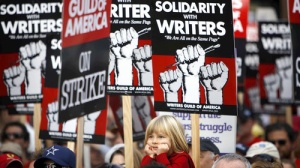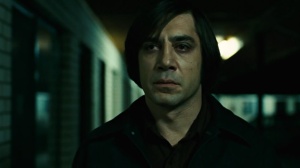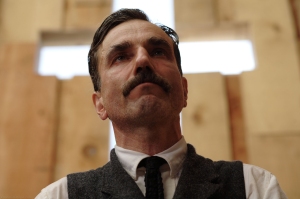On November 5th 2007, the Writer’s Strike began and took Hollywood by storm. Fighting for increased compensation for their work, the members of the Writers Guild of America had officially decided to take a stand against the studios in town that had been turning a heavy profit from DVD releases, the Internet and other multi-media forms that used the writers’ works. Many feared the impending Academy Awards ceremony, set for February 24th 2008, would not go off as planned and without any of the individuals who they planned on awarding. These fears were all for naught, however, as the writers struck a deal on February 12th and the strike became a thing of the past.
While many remember this particular awards season for the strike, other cinephiles remember 2007 for being one of the finest years for film in recent memory. Not only did the year give us an exceptional new Coen brothers film, but it also marked the return of one of America’s infrequently seen auteurs, Paul Thomas Anderson, whose There Will Be Blood was about as bombastic a return-film as one gets. The year also saw the arrival of a new writing voice in Diablo Cody, while also sporting some of the finest acting performances many had seen in quite some time.
As I delve into this particular year in film, I will highlight nine of the categories of this particular Academy Awards ceremony and discuss how differently (or similarly) I saw the very same year in film.
Best Cinematography
2007 was one of those years where film-goers were treated to such an embarrassment of riches when it came to cinematography. From the hauntingly barren old fields of Robert Elswit’s work in There Will Be Blood to the double-bill of visual splendor Roger Deakins provided in No Country for Old Men and The Assassination of Jesse James by the Coward Robert Ford, you’d be hard-pressed to find a flaw in any of the Academy’s nominations. While Elswit deservedly won the Oscar for his work, seeing Deakins be the bridesmaid yet again on awards night was certainly a tough pill to swallow. Many would argue that his work in Jesse James is a career-best, and I wouldn’t disagree. For such a renowned artist as Deakins, it’s hard to believe he has yet to win an Oscar. Here’s hoping that changes sooner rather than later.
As for films whose cinematography was overlooked by the Academy in 2007, I’d point to the work of the late-great Harris Savides on perhaps David Fincher’s best film, Zodiac. As is unfortunately the case in many years, because of its March 2007 release date, the film was a distant memory for the Academy come nominating time. With that said, it’d be difficult to find many film buffs who don’t find Zodiac to be one of the absolute best films 2007 had to offer. It remains to this day one of my personal favorites.
Who Won: Robert Elswit for There Will Be Blood
Who Should Have Won: Elswit, although the other half of me wants to say Deakins for Jesse James
Who Should Have Been Nominated: Harris Savides for Zodiac
Best Original Screenplay
In the Original Screenplay category, who was going to win was never really in doubt. This year was the story of stripper-turned-scribe Diablo Cody and her quirky, off-beat script for Juno. While it’s hard to find a film that has seen more post-Oscars backlash than Juno, I found it to be a pretty enjoyable, albeit minor, entry in Jason Reitman’s filmography. The other nominees in the category highlighted Brad Bird’s script for Pixar’s Ratatouille, Tamara Jenkins’ heartfelt work on her family drama The Savages, Tony Gilroy’s Michael Clayton, and Nancy Oliver’s man-in-love-with-a-doll story, Lars and the Real Girl. Cody’s win was as much about her rags-to-riches story as it was about the script itself, but I’d be more inclined to award Jenkins or Oliver here. Both of their scripts had an emotional wallop to them that I try to emulate in my own work. If forced to choose, give me Oliver. That script took guts.
As for a script that I would have nominated, I’m going in an entirely different direction, albeit with a film that also starred Michael Cera. That’s right, give me the work of Seth Rogen & Evan Goldberg on Superbad. This was their coming-out party, and while it’s a raunchy R-rated teen comedy, it also has a heavy dose of heart not seen in other films of the genre. Although they’ve had quite a career since, this is the one I’ll always remember Rogen & Goldberg for.
Who Won: Diablo Cody for Juno
Who Should Have Won: Nancy Oliver for Lars and the Real Girl
Who Should Have Been Nominated: Seth Rogen & Evan Goldberg for Superbad
Best Adapted Screenplay
Over on the adapted side of things, the Coen brothers adaptation of Cormac McCarthy’s novel No Country For Old Men took home the prize. Of the other nominees, which included Sarah Polley’s tender work on Away from Her, Christopher Hampton’s adaptation of Atonement, and Ronald Harwood’s Diving Bell and the Butterfly, the script which provided the most competition for the Coens was Paul Thomas Anderson’s loose adaptation of Upton Sinclair’s massive Oil!. In fact if I had my way, PTA’s script would have won. While the Coen brothers work is always fantastic, their adaptation was very much in McCarthy’s original voice, while Anderson took his original source material and put his own darkly comic twist on it which resulted in There Will Be Blood. Anderson’s always been an actor’s director and while it could be argued that his direction and the performances are what elevated the film, he has such a knack for dialogue that his script is impossible to overlook.
Of the films that were overlooked, I’m going to be consistent and head to James Vanderbilt’s script for Zodiac. Adapted from the novel by Robert Graysmith, who Jake Gyllenhaal plays in the film, it’s a work that could have easily been cheapened and Hollywoodized, but Vanderbilt did nothing of the sort. It’s an atmospheric and journalistic piece of work, that drew many flattering comparisons to All the President’s Men. Although his work outside of this film has been pretty mediocre, Zodiac shows what Vanderbilt is capable of when truly passionate about the subject matter.
Who Won: Joel & Ethan Coen for No Country For Old Men
Who Should Have Won: Paul Thomas Anderson for There Will Be Blood
Who Should Have Been Nominated: James Vanderbilt for Zodiac
Best Supporting Actress
And now we come to the acting categories, often-times the most debated and heavily competitive of all the Oscar races. First up is Best Supporting Actress, which Tilda Swinton won for her paranoid-infused performance opposite George Clooney in Michael Clayton. It’s certainly a deserving win for an actress who has only grown in stature in recent years, and that’s not faint praise given she went up against the likes of Cate Blanchett in I’m Not There and Saoirse Ronan in Atonement. Amy Ryan was also nominated for her strong work in Ben Affleck’s directorial debut Gone Baby Gone, and while the fifth nominee, Ruby Dee for American Gangster, pales in comparison to her competitors, it’s not a stretch to say that she was nominated for her whole fantastic career rather than just this one minor performance.
Despite No Country tying Blood for the most nominations of the year with eight, it only received one nomination in the acting categories (one we’ll get to next). They could have took the outright lead with a nomination here for Kelly Macdonald’s strong work as the wife of Josh Brolin’s character, who gets a nice showcase in her last scene in the film opposite Javier Bardem’s maniacal Anton Chigurh.
Who Won: Tilda Swinton for Michael Clayton
Who Should Have Won: Swinton
Who Should Have Been Nominated: Kelly Macdonald for No Country for Old Men
Best Supporting Actor
Perhaps the most memorable performance in any Coen brothers film came courtesy of Javier Bardem in No Country. It would have been a massive upset had he not won at the Oscars and sure enough he took home the award, it just so happened to be over one of my favorite performances of the decade, Casey Affleck as Robert Ford in Assassination of Jesse James. To say Bardem is fantastic would be an understatement, but there is just something about Affleck’s performance that creeps under your skin and doesn’t let go. It’s an all encompassing performance, one that is truly the lead in a film where Brad Pitt gets top billing as the titular Jesse James. Bardem plays a truly chilling and iconic villain that no doubt ranks amongst the best in film history, but I’d argue that Affleck’s Ford is up there too.
As for those performances not nominated, there is truly an endless list of worthy actors. Youngster Ed Sanders as Toby in Sweeney Todd certainly ranks up there among my favorites, while Mark Ruffalo and Robert Downey Jr. would also have been deserving for their work in Zodiac. Honestly, Best Supporting Actor always seems to have the most possible nominees year in and year out, and 2007 definitely ranks up there with the best years for the category. One snub however, that is practically insane is that of Paul Dano for There Will Be Blood. He goes toe to toe with perhaps the most critically-acclaimed actor of all-time and succeeds. That is no easy task, and he makes it look easy.
Who Won: Javier Bardem for No Country for Old Men
Who Should Have Won: Casey Affleck for The Assassination of Jesse James by the Coward Robert Ford
Who Should Have Been Nominated: Paul Dano in There Will Be Blood
Best Actress
A category that would be much stronger year in and year out if studios would actually commit to consistently creating great lead roles for actresses, this was one such year where there appeared to be a premium. Marion Cotillard took home the award for her performance as famed singer Edith Piaf in La Vie En Rose. It’s a film I admittedly have not seen (I’m such a hypocrite), but if Cotillard’s performances following this one are any indication, I can only assume it was every bit deserving of the honor. She went up against Julie Christie’s fantastic work in Away from Her, the always wonderful Laura Linney in The Savages, Ellen Page’s breakthrough in Juno, and Cate Blanchett as the titular Queen in Elizabeth: The Golden Age.
One performance that was frustratingly overlooked by the Academy was Marketa Irglova’s performance in the musically-inclined Once, where she was every bit the match of a great Glen Hansard. Not only is she a fantastic singer (she and Hansard won Best Original Song), but she gives her character a tenderness and a strength often not found in the typical romantic leading lady. It remains her sole credit (outside of a cameo on The Simpsons) so here’s hoping we see more from Irglova sooner rather than later.
Who Won: Marion Cotillard for La Vie En Rose
Who Should Have Won: Cotillard
Who Should Have Been Nominated: Marketa Irglova in Once
Best Actor
There will be no debate here. The year of 2007 was the year of Daniel Day-Lewis’ performance as Daniel Plainview in There Will Be Blood. A role written specifically for him, it’s certainly not hard to see why. It’s acting as bombastic as the film itself, sometimes over the top but always compelling. It’s a portrait of a man torn between his greed for success in the oil business and his love for his son, and you feel his consternation every step of the way. In a career full of great performances, this one is probably Day-Lewis’ best. He holds the screen for every second, and in turn, he holds you.
An actor of an entirely different sort is Jake Gyllenhaal, one who brings mesmerizing subtleties to each role he takes. His lead performance as San Francisco Chronicle cartoonist Robert Graysmith in Zodiac is one such performance which the Academy chose to overlook. Gyllenhaal’s Graysmith is equal parts boy scout, hapless romantic, and neurotic obsessive. Zodiac is a film about obsession and Gyllenhaal anchors it with his own brand, one that forces him to overlook every other aspect of his life in order to find out just who the Zodiac killer actually is. There’s a moment late in the film when he sees the man he’s always thought to be the killer. It’s a chilling moment, and although we never get any confirmation as to his identity, Gyllenhaal’s face is truly all the confirmation we need.
Who Won: Daniel Day-Lewis for There Will Be Blood
Who Should Have Won: Day-Lewis
Who Should Have Been Nominated: Jake Gyllenhaal in Zodiac
Best Director
Arguing against the Coen brothers winning Best Director is a fight you probably can’t win amongst any group of hardcore cinephiles, but it doesn’t mean I’m not going to try. First of all, the Coen brothers were highly deserving of the honor and any amount of awards they have on their shelves simply isn’t enough. With that said, there simply was not a better directorial effort in 2007 than that of Paul Thomas Anderson’s on There Will Be Blood. It’s a masterwork, one heavily indebted to not only the great Stanley Kubrick but to John Huston and his Humphrey Bogart-starrer The Treasure of the Sierra Madre. Blood is a film that not only visually captures that feel of an old Hollywood classic, but it makes what was once classic new again. From the dialogue-free opening to the bloody bowling alley finale, this is a film made by a director at the top of his game. It’s brimming with confidence, from the performances to the bravura tracking shots. Although many might say There Will Be Blood is a work that might be impossible to out-do, that’s not going to stop Paul Thomas Anderson from trying.
Another director, upon which Anderson once wished ‘testicular f***ing cancer’ (it’s a fun story, look it up), who was working at the top of his game around the same time was David Fincher. After the same five-year absence from the world of film as Anderson, Fincher returned with a film he has yet to top himself, Zodiac. I’ve already heaped enough praise on it to last a lifetime, but let’s just say it’s a masterpiece and leave it at that.
Who Won: Joel & Ethan Coen for No Country for Old Men
Who Should Have Won: Paul Thomas Anderson for There Will Be Blood
Who Should Have Been Nominated: David Fincher for Zodiac
Best Picture
And now we come to the biggest award of all. As I stated in my introduction for this series of blog posts, there has yet to be a Best Picture winner in my lifetime that I also agreed was the best film of the year. No Country for Old Men took the award this year and is no doubt a fantastic film that ranks up there with the best the year had to offer. With that said, There Will Be Blood was the best film of the year. It’s a film that has stood the test of time already, garnering an endless amount of accolades in the years following its loss and ending up on the most Best of the Decade lists of any film released in the years 2000 to 2009. For me, it is the best film of the decade and truly an American classic if there ever was one. It sports one of the most memorable acting performances of all-time and thematically was as relevant to the time in which it was released as to the time period in which it was set. It is one of my favorite films of all-time and will no doubt remain that way for the foreseeable future.
What should also be noted is that 2007 was one of the last years where the Best Picture category was limited to five nominees. Had it been extended, there’s no telling what films would have also been nominated, but of course I would have been partial to David Fincher’s Zodiac. I don’t think it’s just one of the ten best films of the year, it’s second to only There Will Be Blood in my mind as the Best Film of the Decade.
What Won: No Country for Old Men
What Should Have Won: There Will Be Blood
What Should Have Been Nominated: Zodiac
So there you have it, my entry in The Academy & I which spanned the year in film that was 2007. Up next, 2008. It was a year that would change the Academy Awards forever and, depending on who you ask, that was either a very good thing or a very bad thing.










“It’s a film that has stood the test of time already, garnering an endless amount of accolades in the years following its loss and ending up on the most Best of the Decade lists of any film released in the years 2000 to 2009.”
Being fair, that could also apply to No Country 😛
Both great films, to be honest, both were the right choices for BP.
Very true my friend. Thanks for reading!
– Andrew